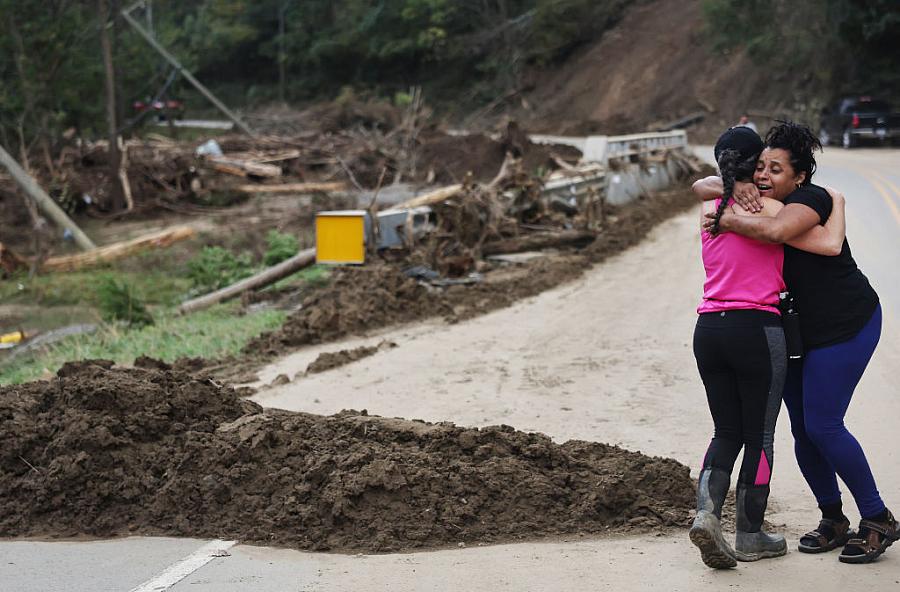Journalists play an essential role in holding government to account as disasters unfold

The Trump administration has moved to cancel or freeze federal funding for some disaster preparedness and relief programs, primarily through FEMA. A report from a FEMA Review Council is expected later this month and the future of the agency may largely depend on the administration’s reaction to the council’s recommendations.
In the meantime, journalists can play a key role in getting lawmakers to better understand inequities in the nation’s federal disaster response system. They also should understand their own local and state resources, since much recovery starts well below the federal level.
Those were key takeaways from a panel discussion on disaster response and the role of federal government at the inaugural Health and Climate Change Reporting Fellowship in Los Angeles last week. The event was jointly presented by the USC Annenberg’s Center for Health Journalism and Center for Climate Journalism and Communication.
Samantha Montano, assistant professor of Emergency Management at the Massachusetts Maritime Academy and author of “Disasterology: Dispatches from the Frontlines of the Climate Crisis,” opened with a fast-paced primer on how disaster response typically unfolds. While every crisis looks different, she said, the system is generally hierarchical.
“First responders will be local entities,” she explained. “Once locals are overwhelmed, then the state comes in to help… hopefully led by state emergency management, but also bringing resources from other state agencies. Once they are overwhelmed, that’s when we start looking for help from other states through our [Emergency Management Assistance Compact] system… And then also from the federal government, particularly FEMA.”
If FEMA arrives early, she noted, it usually signals that officials anticipate local and state resources will be quickly exhausted. In other cases, FEMA may not appear until the recovery phase is already underway.
Montano stressed that FEMA’s presence does not mean it takes over. “It is still the primary responsibility of local government,” she said. “FEMA is there as a support to those local efforts.”
Following plans, money and people
Much of the panel conversation focused on inequities in disaster aid and coverage, particularly for marginalized communities. Latisha Nixon-Jones, associate professor of law at the University of Nevada, Las Vegas, outlined a three-step framework for reporters: follow the emergency management plans, follow the money, and follow the people.
Municipal emergency plans offer a roadmap for notification, evacuation, sheltering, communication systems, and agency responsibilities — though she noted that wealthier communities often have more robust plans, an inequity in itself.
Reporters should also track local spending in the early aftermath of a disaster. “Those small grassroots mom-and-pop businesses, micro-businesses, generally have the contracts in place to start providing food,” Nixon-Jones said.
Many small nonprofits and community organizations like shelters or other service providers are already contracted by the city or state to provide services and get reimbursed. Because they have those contracts in place, such organizations can start providing assistance quickly and get reimbursed later for it.
Understanding state supports like disaster unemployment or disaster food benefits is also essential.
Finally, she urged journalists to broaden their lens beyond homeowners and renters, who receive the bulk of federal aid. “Those that are unhoused, those that are disabled… even if they do apply [for aid], don't have the resources for the follow-up,” she said. Following these threads can reveal critical equity gaps.
Unequal recovery after disasters
Pulitzer Prize–winning investigative reporter Jennifer Berry-Hawes, who joined ProPublica after more than two decades at The Post and Courier in Charleston, shared findings from her recent reporting on Hurricane Helene in North Carolina.
In most places, wealthier households received more FEMA aid. “But in Buncombe County, we saw the opposite,” she said. Lower-income households received more aid largely because nonprofits, including faith-based organizations, stepped in to help residents complete FEMA applications.
Berry-Hawes emphasized the unequal burden of trauma. After a disaster, people with less resources often have less capacity to deal with the arduous aid process, she said. Without access to legal help or advocates, many are unable to secure the full amount of assistance they’re eligible for.
Nixon-Jones added that FEMA’s high denial rate makes it essential for journalists to understand the appeals process. Many such denials stem from missing documents, communication breakdowns with displaced residents, or simply a lack of awareness that an appeal is possible.
Local journalism is essential, and language matters
The panelists underscored the centrality of local newsrooms in disaster communication. Berry-Hawes cited Blue Ridge Public Radio’s role after Helene. While roads were washed out and cell and internet service down, “you could go to your car and turn it on and get the radio.” The station became a lifeline for updates on safe water, food, medical help, and more.
Montano agreed the essential role played by local journalists. “Once the national media leaves after the response, there’s that long trail of recovery that comes next — years, decades in some places. There needs to be continuous reporting on what is happening in that recovery process.”
The panel closed with a reminder about language. Calling people “survivors” rather than “victims” is more empowering, the speakers agreed. They also discussed how terms like “natural disaster” or “climate disaster” oversimplify the reality.
“Any disaster that happens is an interaction between a hazard and our vulnerabilities,” Montano said. Those vulnerabilities — land-use decisions, building practices, policy choices — are human-made. “The thing to do here is to just say disaster. Save a word,” she added.

